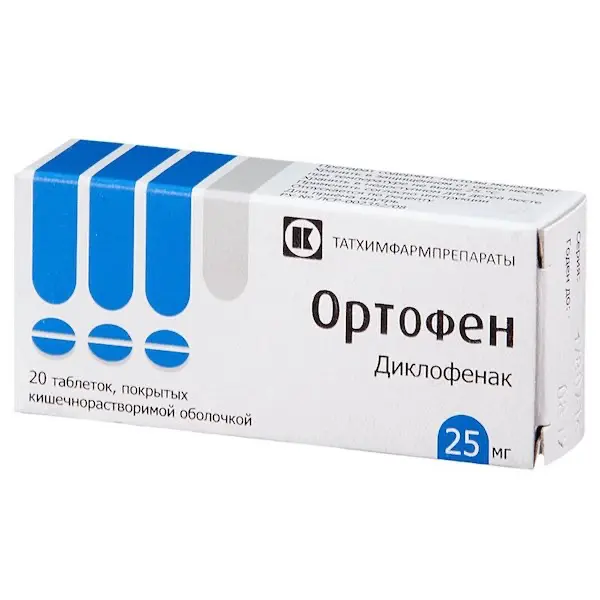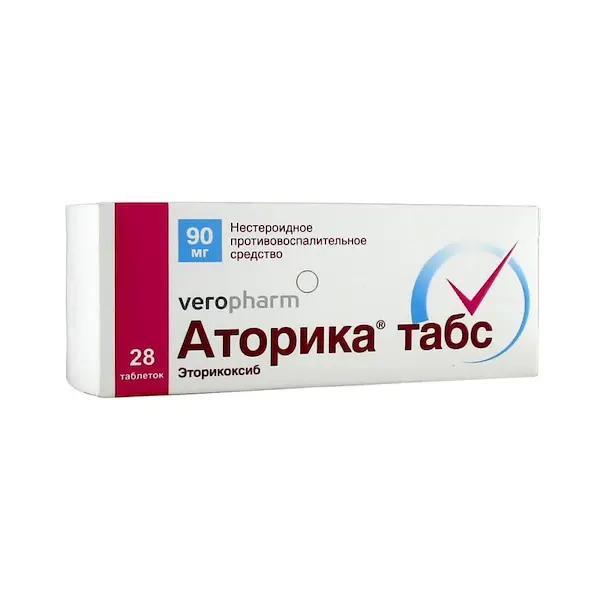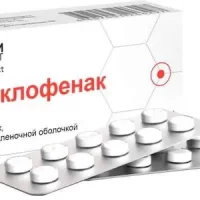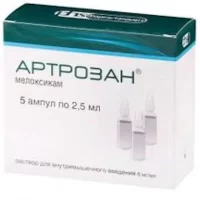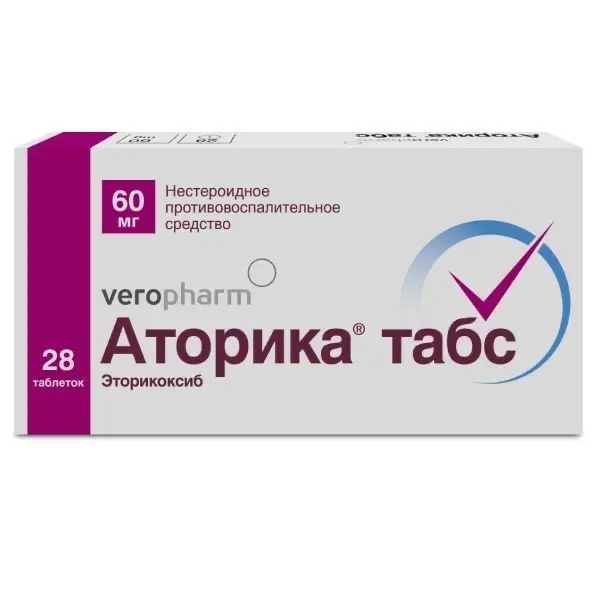Description
Orthofen Pharmacodynamics
The drug contains sodium diclofenac, a substance of non-steroidal structure, which has a pronounced anti-inflammatory, analgesic and antipyretic effect.
The main mechanism of action of diclofenac, established in studies, is considered to be inhibition of prostaglandin biosynthesis. Prostaglandins play an important role in the genesis of inflammation, pain and fever.
In vitro diclofenac sodium in concentrations equivalent to those achieved when used in humans does not inhibit cartilage proteoglycan biosynthesis.
In rheumatic diseases the anti-inflammatory and analgesic properties of the drug provide a clinical effect characterized by a significant reduction of such manifestations as pain at rest and on movement, morning stiffness and joint swelling, as well as improvement of functional status.
At posttraumatic and postoperative inflammatory phenomena diclofenac quickly stops pain (both at rest and during movement), reduces inflammatory swelling and edema of postoperative wound
When using the drug, a pronounced analgesic effect was noted for moderate to severe pain of non-rheumatic origin.
It is also found that diclofenac is able to reduce pain sensations and decrease blood loss in primary dysmenorrhea.
Indications
– Inflammatory and degenerative diseases of the musculoskeletal system including:
– rheumatoid, juvenile chronic arthritis;
– Ankylosing spondylitis and other spondyloarthropathies;
– osteoarthritis;
– gouty arthritis;
– bursitis, tendovaginitis.
– Pain syndromes from the spine (lumbago, sciatica, ossalgia, neuralgia, myalgia, arthralgia, radiculitis).
– Post-traumatic and post-operative pain syndrome accompanied by inflammation, for example, in dentistry and orthopedics.
– Algodysmenorrhea; pelvic inflammatory processes, including adnexitis
Isolated fever is not an indication for the use of the drug.
The drug is intended for symptomatic therapy, to reduce pain and inflammation at the time of use, it has no effect on the progression of the disease.
Contraindications
– Exacerbation of gastric and duodenal ulcer, bleeding from the organs of the gastrointestinal tract (GIT), perforation of the organs of the GIT.
– Hypersensitivity to diclofenac and any other components of the drug.
– III trimester of pregnancy.
– As other non-steroidal anti-inflammatory drugs (NSAIDs), Orthofen is contraindicated in patients with a complete or incomplete combination of bronchial asthma, recurrent polyposis of the nose and sinuses and intolerance to acetylsalicylic acid or other NSAIDs (including a history).
– Severe hepatic impairment, renal insufficiency (GFR less than 15 ml/min/1.73 m2), chronic heart failure (functional class II-IV according to NYHA classification).
– Coronary heart disease
– Cerebrovascular diseases, peripheral arterial disease.
– Increased risk of arterial thrombosis and thromboembolisms, uncontrolled arterial hypertension.
– Conditions accompanied by the risk of bleeding.
– Confirmed hyperkalemia.
– Aortocoronary bypass surgery (perioperative period).
– Inflammatory bowel disease (Crohn’s disease, ulcerative colitis) in the acute phase.
– Active liver disease.
– Breast-feeding period.
– Hereditary severe lactose intolerance, lactase deficiency and glucose-galactose malabsorption (because the dosage form contains lactose).
– It is not recommended to use the drug Orthofen film-coated enteric-soluble tablets 25 mg in children under 6 years of age.
Dosage and administration
- Dosage of the drug is adjusted individually, and in order to reduce the risk of side effects it is recommended to use the minimum effective dose, if possible, with the shortest possible treatment period according to the purpose of treatment and the patient’s condition.
- Tablets should be swallowed whole with fluids, preferably before meals. The tablets should not be divided or chewed.
- Adults
The recommended starting dose is 100-150 mg/day. A daily dose of 75-100 mg may be sufficient for relatively mild cases and for long-term therapy. The daily dose should be divided into several doses. For relief of nighttime pain or morning stiffness, in addition to taking the drug during the day, diclofenac is used in the form of rectal suppositories before bedtime; the total daily dose should not exceed 150 mg. - In primary dysmenorrhea daily dose is adjusted individually; usually it is 50-150 mg. The initial dose should be 50-100 mg; if necessary it may be increased to 150 mg/day during several menstrual cycles. The drug should be started at the appearance of the first symptoms. Depending on the dynamics of clinical symptoms, treatment may be continued for several days.
- In children aged 6 years and older, Ortofen in form of film-coated, enteric-soluble tablets, 25 mg, is administered at the rate of 0.5-2 mg/kg of body weight per day (the daily dose should be divided into 2-3 single doses, depending on the severity of the symptoms).
In children under 6 years of age, the drug should be used in another dosage form.
To treat rheumatoid arthritis, the daily dose may be maximally increased to 3 mg/kg (in several doses). The maximum daily dose should not exceed 150 mg. - Elderly patients (≥65 years)
Adjustment of the initial dose in patients aged 65 years or older is generally not required. However, based on general medical considerations, caution should be exercised in frail elderly patients or patients with low body weight - Patients with cardiovascular disease or high cardiovascular risk
Particular caution should be used in patients with cardiovascular disease or high risk of cardiovascular disease. If prolonged therapy (more than 4 weeks) in such patients is necessary, the daily dose should not exceed 100 mg. - Patients with impaired renal function
There is no data concerning the necessity of the dose adjustment while using this medicine in patients with kidney dysfunction because of absence of studying of safety of this medicine use in patients of this category. Caution should be exercised when using the drug in patients with impaired renal function. - The drug is contraindicated in patients with renal insufficiency (GFR less than 15 ml/min/1.73 m2) (see section “Contraindications”),
- Patients with liver dysfunction
There is no data about the necessity to correct the dose when using the drug in patients with liver dysfunction of mild to moderate severity due to the absence of safety studies of the drug use in this category of patients. - The drug is contraindicated in patients with severe hepatic impairment (see section “Contraindications”).

